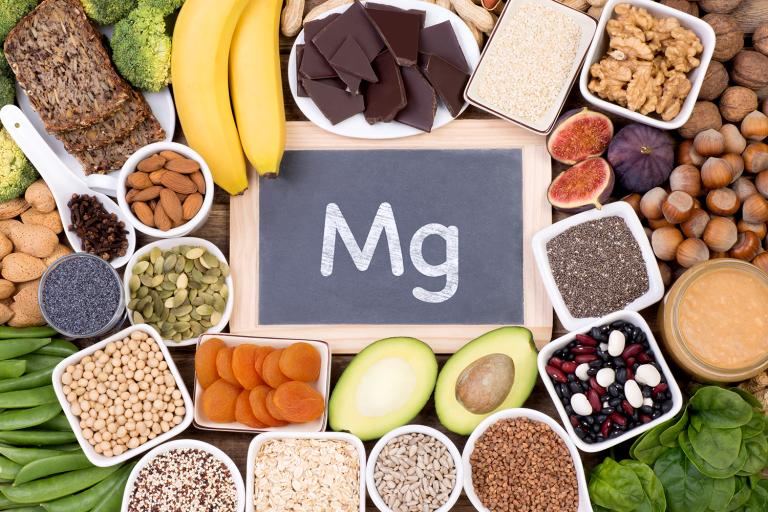The mineral magnesium is vital for our health.
It’s linked to more than 700 important body functions, ranging from energy production and blood pressure regulation, to heart health and muscle and nerve function.
Food Sources of Magnesium
This mood mineral can be found in:
- dark green, leafy veggies, like:
- spinach
- kale
- collard greens
- legumes and peas
- whole grains
- nuts, especially:
- almonds
- cashews
- peanuts
- milk and yogurt
- dark chocolate
Magnesium Deficiency
Despite magnesium’s widespread availability in food sources, medical research has shown that Americans consistently struggle with magnesium deficiency, not getting the daily recommended amounts.
Part of the reason is that modern soils have been depleted of this mineral. Another factor is that there is too much reliance on processed foods in American diets. Conditions that increase likelihood of a deficiency include obesity and diabetes.
Diagnosing Magnesium Deficiency
However, some people may not be aware of their magnesium deficiency because the mineral works inside cells, not while coursing through the bloodstream.
A deficiency often won’t show up in a blood test, so diagnosis is a challenge.
Although difficult to discover, magnesium deficiencies are common: Up to 80 percent of Americans do not get enough magnesium.
In addition to dietary shortages, deficiencies can also be caused by overactive stress hormones or too much calcium.
Symptoms of Magnesium Deficiency
Low magnesium levels can lead to medical issues including:
- cardiovascular disease
- osteoporosis
- high blood pressure
- Type 2 diabetes
- muscle cramps
- immune system issues
Low magnesium levels are also linked to Alzheimer's disease, migraines, and ADHD.
Other symptoms of magnesium deficiency include:
- loss of appetite
- nausea
- fatigue
- weakness
- numbness
- tingling
- abnormal heart rhythms (arrhythmias)
Who is at Risk?
People who are particularly at risk for low magnesium levels include:
- those who drink alcohol regularly
- those with gastrointestinal diseases
- postmenopausal women
- the elderly
Supplementing with Magnesium
Taking a magnesium supplement is an easy way to get the recommended daily intake.
However, most multivitamins contain less than 100 milligrams (mg) of magnesium, so taking a separate magnesium supplement may be the best way to reach the Recommended Dietary Allowance (RDA).
The National Institutes of Health RDA recommendations are: 310 mg for women 19-30; 400 mg for men 19-30; 320 mg for women 31 and older; 420 for men 31 and older.
Pregnant women need higher levels of magnesium: 400 mg for ages 14-18; 350 mg for ages 19-30; and 360 for ages 31-50.
There are different forms of magnesium that perform differently in the body.
Research indicates that some people who take magnesium supplements may experience significant improvements in lipoproteins, C-reactive protein, fasting glucose, and insulin resistance.
Magnesium for Calm
It’s also known as “the mood mineral” because it helps decrease feelings of stress, anxiety, and depression.
The Washington Post listed magnesium as one of the ten nutrients that can "lift your spirits," due to the large role it plays in the development of serotonin, a hormone linked to feelings of happiness and well-being.
It has also been called an antistress mineral as it can help prevent feelings of nervousness or irritability.
PsychologyToday.com reviewed scientific studies of the mineral and labeled it the “original chill pill,” because of evidence supporting its health and calming benefits.

